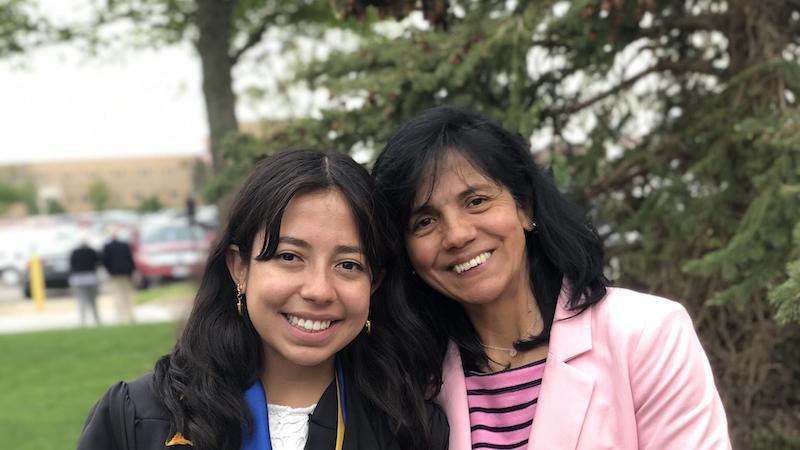To celebrate Hispanic Heritage Month, Camila León wrote to honor the impact of her abuelita, or grandmother, on her path as a student and teacher. An English translation follows Camila's Spanish post.
 Cuando pienso en el Mes de la Herencia Hispana, la primera persona que me viene a la mente es mi abuelita Matilde. Cuando ella era niña, mi abuelita fue expulsada de su casa en las montañas colombianas y obligada a trabajar desde muy joven. Como resultado, mi abuelita nunca puso un pie en un lugar que yo visito todos los días: una escuela. Muchos la consideraban como analfabeta por su incapacidad para leer y escribir, pero al reflexionar sobre su vida y sus enseñanzas, me opongo a esa consideración. Por el contrario, el “analfabetismo” de mi abuelita le permitió compartir sus valores de la educación y colectivismo con sus hijos, quienes a su vez los han compartido con sus hijos. Sus ideas han impactado quién soy y, por lo tanto, sus ideas viven dentro de la cultura de mi salón de clases. En general, sus ideas han existido y transmitido de generación en generación: esto es alfabetización.
Cuando pienso en el Mes de la Herencia Hispana, la primera persona que me viene a la mente es mi abuelita Matilde. Cuando ella era niña, mi abuelita fue expulsada de su casa en las montañas colombianas y obligada a trabajar desde muy joven. Como resultado, mi abuelita nunca puso un pie en un lugar que yo visito todos los días: una escuela. Muchos la consideraban como analfabeta por su incapacidad para leer y escribir, pero al reflexionar sobre su vida y sus enseñanzas, me opongo a esa consideración. Por el contrario, el “analfabetismo” de mi abuelita le permitió compartir sus valores de la educación y colectivismo con sus hijos, quienes a su vez los han compartido con sus hijos. Sus ideas han impactado quién soy y, por lo tanto, sus ideas viven dentro de la cultura de mi salón de clases. En general, sus ideas han existido y transmitido de generación en generación: esto es alfabetización.
Una enseñanza de mi abuelita que está presente en mi salón de clases es el valor del colectivismo, o la importancia del grupo sobre el individuo. No es sorprendente que la comunidad hispana/latina sea considerada altamente colectivista. Dado que yo, una latina, enseño en una escuela donde el grupo demográfico es mayoritariamente hispano/latino, noté desde el principio que mis alumnos actuaban de una manera muy colectivista. Por ejemplo, se ayudan mutuamente durante el tiempo de trabajo. Cuando un estudiante termina temprano su trabajo, va a ayudar a su compañero sin que se le indique que lo haga. Con la esperanza de honrar aún más a mi abuelita y los valores de nuestra cultura, me he vuelto más intencional en promover un espacio comunitario de intercambio para mis estudiantes con oportunidades para la colaboración entre pares, “show-and-tell”, y tiempo de trabajo en grupo.
 La segunda enseñanza de mi abuelita es el valor de la educación. Al no haber tenido el privilegio de recibir una educación formal, mi abuelita comprendió perfectamente su valor. Promover el amor por la educación y el conocimiento es crucial para la cultura del salón. Aún así, es nuestro deber como educadores reconocer los vastos conocimientos que nuestros estudiantes aportan. Aunque mi abuelita era “analfabeta”, poseía conocimientos en varios campos además de la lectura y la escritura. De manera similar, nuestros estudiantes poseen conocimientos en campos que pueden no ser frecuentes en el sistema escolar estadounidense. Por ejemplo, algunos de nuestros estudiantes hispanos/latinos pueden tener dificultades con el inglés, todavía tienen una gran cantidad de palabras, principalmente en español. Por lo tanto, como maestros es nuestro deber reconocer y aprender esas alfabetizaciones con el fin de apoyar mejor a nuestros estudiantes.
La segunda enseñanza de mi abuelita es el valor de la educación. Al no haber tenido el privilegio de recibir una educación formal, mi abuelita comprendió perfectamente su valor. Promover el amor por la educación y el conocimiento es crucial para la cultura del salón. Aún así, es nuestro deber como educadores reconocer los vastos conocimientos que nuestros estudiantes aportan. Aunque mi abuelita era “analfabeta”, poseía conocimientos en varios campos además de la lectura y la escritura. De manera similar, nuestros estudiantes poseen conocimientos en campos que pueden no ser frecuentes en el sistema escolar estadounidense. Por ejemplo, algunos de nuestros estudiantes hispanos/latinos pueden tener dificultades con el inglés, todavía tienen una gran cantidad de palabras, principalmente en español. Por lo tanto, como maestros es nuestro deber reconocer y aprender esas alfabetizaciones con el fin de apoyar mejor a nuestros estudiantes.
Las enseñanzas de mi abuelita fueron tan significativas que catalizaron el viaje de mi madre lejos del único hogar que había conocido. Este acto de colectivismo de mi madre se realizó con la esperanza de que algún día su familia tuviera una mejor educación que la de nuestros predecesores. De manera similar, honro las enseñanzas de mi abuela sobre el colectivismo y la educación en el salón todos los días, y sostengo que todos deberíamos hacer lo mismo.
When I think about Hispanic Heritage Month, the first person that comes to mind is my abuelita, Matilde. As a child, my abuelita was driven away from her home in the Colombian mountains and forced to work from a young age. As a result, my abuelita never stepped foot into a place that I visit everyday – a school. Her inability to read and write labeled her illiterate by many, but as I reflect on her life and teachings, I argue against this label. On the contrary, my abuelita’s literacy allowed her to share her values about education and collectivism with her children, who have in turn shared them with their children. Her ideas about education and collectivism have impacted who I am and have thus influenced my classroom’s culture. Despite my abuelita’s status as being “illiterate,” her perspective of education and the values that have been instilled in me through generations illustrates her own form of being literate.
One teaching from my abuelita that is present in my classroom is the value of collectivism, or the importance of the group over the individual self. Various research studies (as well as my own experience) illustrate that the Hispanic/Latinx community is highly collectivist. Since I, a Latina, teach in a school whose demographic is largely Hispanic/Latinx, I noticed early on that my students acted in a quite collectivist manner. For example, my students are always quick to help each other during work time. When a student finishes his/her work early, they go help their neighbor without having to be directed to do so. In hopes of further honoring my abuelita and our culture’s values, I have become more intentional about encouraging these moments of collectivist action and promoting a communal space of sharing for my students with opportunities for peer collaboration such as show-and-tell and group work time.
The second teaching from my abuelita that resides with me is her perspective on the value of education. Having not been privileged enough to receive a formal education, my abuelita strongly understood its value and prioritized access to quality education for her children. Despite never having met my abuelita, her focus upon the value of education has impacted me to such an extent that I myself am now an educator promoting the love for education each day in my classroom. Part of promoting that love for education in our classrooms is by acknowledging the vast funds of knowledge that our students bring to the table. Although my abuelita was “illiterate,” she possessed literacies in various fields of knowledge outside of reading and writing. Similarly, our students possess literacies in fields that may not be prevalent in the American school system. For example, while some of our Hispanic/Latinx students might struggle with English, they still have a wealth of words to work with, primarily in Spanish. Thus, as culturally relevant and sustaining teachers, it’s our duty to both recognize and learn those literacies for the sake of best supporting our students.
My abuelita’s teachings were so significant that it catalyzed my mother’s voyage away from the only home she had ever known. This collectivist act by my mother was done with hopes that her family would one day have a better education than that of our predecessors. Building upon the collectivist legacy of my ancestors, I honor my grandmother’s life and teachings in my classroom every day, and in the spirit of Hispanic Heritage Month, each teacher should recognize the fruitful and life-giving heritages of our students and ancestors in order to best acknowledge our students’ cultures and support their learning.
 Alliance for Catholic Education
Alliance for Catholic Education
